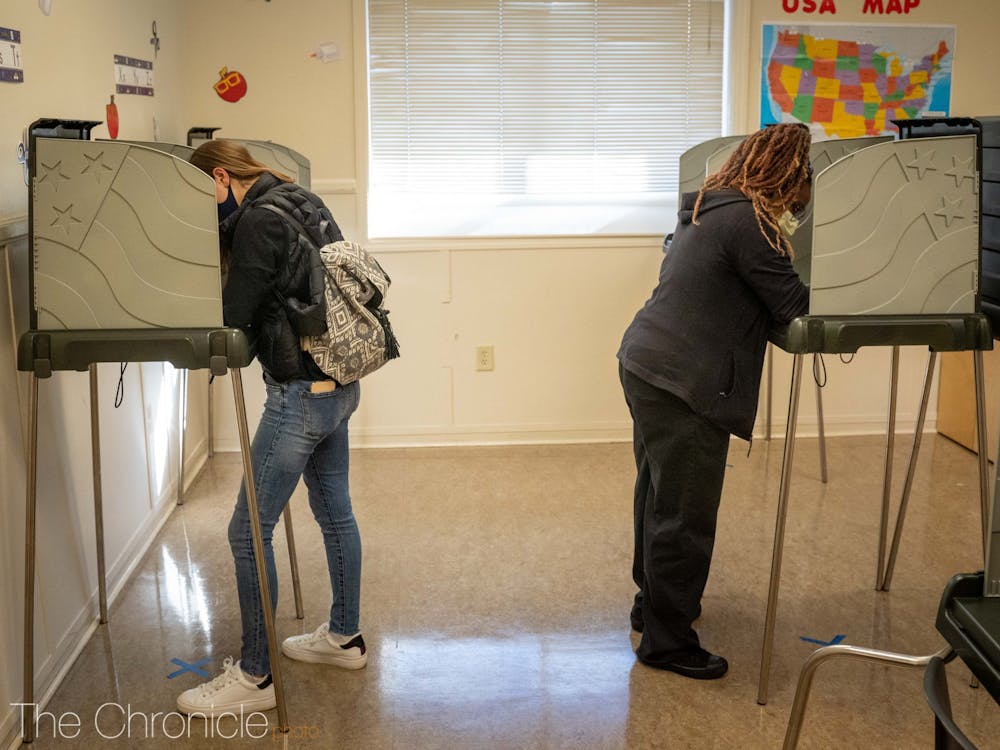After a close and contentious 2020 election in North Carolina, three bills circulating in the North Carolina General Assembly would create major changes in the state’s election laws.
Senate Bills 326, 724 and 725 target absentee voting access and private election donations. The bills have similar provisions to other laws being introduced in legislatures of at least 48 states.
The sponsors of the bills—Senators Ralph Hise of Spruce Pine, Warren Daniel of Morganton and Paul Newton of Mt. Pleasant—initially introduced them as one bill that they called the Election Integrity Act but split it into three as the legislation moved through committee.
Senate Bill 326
Senate Bill 326 would shorten the deadline for counties to receive valid mail-in absentee ballots. The current law states that absentee ballots can be received up to 5 p.m. three days after an election, if the ballots are postmarked on or before the day of an election. Under SB 326, absentee ballots would have to be received by 5 p.m. on election day to be counted.
“I think we got 14,500 ballots received and counted after election night,” Newton noted in an interview with WITN News. “That breeds suspicion in the mind of some North Carolinians. What could go wrong with 14,500 votes coming in after election night?”
“The bill itself is part of our ongoing effort to refine the [election] process, make it more secure” Daniel said in an interview with The North State Journal.
However, Democrats and voting rights advocacy groups have a different stance on the bills.
Democracy NC, a nonprofit with a mission to “strengthen democratic structures, empower disenfranchised communities, and build trust in improved political processes” has taken a very strong opposing stance.
Carol Moreno, research associate with Democracy NC, wrote in an email that 326 fails to “take into consideration the limitations that voters—particularly Black, Brown, disabled and working voters—face in voting.”
She noted that student voters would be adversely impacted “because many students vote by absentee in their home counties where their families permanently reside. For out-of-state students, the timeframe to receive and return a ballot would be worrisome.”
In 2020, about 11,000 absentee ballots arrived in the three day grace period after election day. Under 326, none of these votes would have been valid.
Senate Bill 724
SB 724 would authorize visually impaired voters to cast absentee ballots online, allow citizens to register to vote or change their registration online and state the intent of the General Assembly to identify individuals who still need a photo identification to vote in person.
“Democracy NC’s largest concern with this bill is the decision to provide funding towards voter ID implementation, when we don’t have a voter ID requirement. Legislators have continuously ignored that past efforts have been struck down by the courts,” Moreno wrote.
Moreno added that students would have to spend hours traveling back and forth to get the proper identification documents, a feat difficult for those with limited access to transportation.
North Carolina’s voter ID law is currently being litigated, with a state court ruling blocking the law from going into effect in the 2020 elections on the grounds that it would have a “negative impact on African Americans because they lack acceptable IDs at a greater rate than white voters.” However, the U.S. Court of Appeals for the Fourth Circuit reversed this decision in December of 2020, and the future of voter ID in this state is still unclear.
Senate Bill 725
SB 725 would prohibit private monetary donations from being used to help fund elections.
“There was an open door to private donations that were made with respect to election administration [in 2020], which gave rise to the potential, and the actual appearance of impropriety,” Newton told The News & Observer.
Get The Chronicle straight to your inbox
Sign up for our weekly newsletter. Cancel at any time.
Moreno disputed this claim, noting that in 2020, 97 out of 100 counties received private election funding to purchase 6 million single-use pens to use at voting sites, pay bonuses to poll workers and send mailings to registered voters.
She added that many county Boards of Elections, especially in rural areas, rely on private funding to supplement their budget and that SB 725 would make voting more inaccessible.
Sen. Mike Woodard of Durham County told The Chronicle that Republican sponsors reached out to six of his Democratic colleagues as part of the legislative process for these bills.
“It’s a little odd how they chose to reach out to these legislators. Only towards the end did they reach out to anyone who’s in our caucus leadership on this,” Woodard said. “But in the end, [they] rejected all the ideas that Democratic senators proposed.”
All three bills passed the NC Senate with no Democrats voting for them, and they are now due to be heard in the House. If they pass the House, they will head to Governor Roy Cooper’s desk, where Cooper has indicated he will veto all three bills, according to Woodard.
“These three bills, while they may not be as draconian as what we’ve seen in Florida, Texas or Arizona, are all part of the same pattern of Republican legislative majorities putting obstacles in voters’ way from fully exercising their franchise to vote,” Woodard said.
Anisha Reddy is a Trinity junior and a senior editor of The Chronicle's 118th volume.

